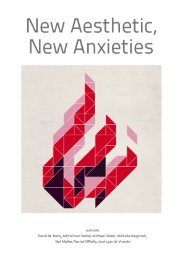Create successful ePaper yourself
Turn your PDF publications into a flip-book with our unique Google optimized e-Paper software.
is also the thought of what is relative, the thing relayed as well as the thing<br />
related. The thought of errantry is a poetics, whith always infers that at some<br />
moment it is told. The tale of errantry is the tale of Relation.<br />
In contrast to arrowlike nomadism (discovery or conquest), in contrast to the<br />
situation of exile, errantry gives-on-and-with the negation of every pole and<br />
every metropolis, whether connected or not to a conqueror's voyaging act. We<br />
have repeatedly mentioned that the first thing exported by the conqueror was<br />
his language. Moreover, the great Western languages were supposedly vehicular<br />
languages, which often took the place of an actual metropolis. Relation, in<br />
contrast, is spoken multilingually. Going beyond the impositions of economic<br />
forces and cultural pressures, Relation rightfully opposes the totalitarianism of<br />
any monolingual intent.<br />
At this point we seem to be far removed from the sufferings and<br />
preoccupations of those who must bear the world's injustice. Their errantry is,<br />
in effect, immobile. They have never experienced the melancholy and ·<br />
extroverted luxury of uprooting. They do not travel. But one of the constants of<br />
our world is that a knowledge of roots will be conveyed to them from within<br />
intuitions of Relation from now on. Travelling is no longer the locus of power but<br />
rather a pleasurable, if privileged time. The ontological obsession with<br />
knowledge gives way here to the enjoyment of a relation; in its elementary and<br />
often caricatural form this is tourism. Those who stay behind thrill to this<br />
passion for the world shared by all. Or indeed they may suffer the torments of<br />
internal exile.<br />
I would not describe the physical situation of those who suffer the<br />
oppression of an Other within their own country, such as the blacks in South<br />
Africa, as internal exile. Because the solution here is visible and the outc o me<br />
determined; force alone can oppose this. Internal exile strikes individuals living<br />
where solutions concerning the relationship of a community to its surroundings<br />
are not, or at least not yet, consented to by this community as a whole. These<br />
solutions, precariously outlined as decisions, are still the prerogative of only a<br />
few who as a result are marginalized. Internal exile is the voyage out of this<br />
enclosure. It is a motionless and exacerbated introduction to the thought of<br />
errantry. Most often it is diverted into partial, pleasurable compensations in<br />
which the individual is consumed. Internal exile tends toward material comfort,<br />
which cannot really distract from anguish.<br />
Whereas exile may erode one's sense of identity, the thought of errantry -<br />
the thought of that which relates - usually reinforces this sense of identity. It<br />
seems possible, at least to one observer, that the persecuted errantry, the<br />
wandering of the Jews, may have reinforced their sense of identity far more than<br />
their present settling in the land of Palestine. Being exiled Jews turned into a<br />
76/ /THEORETICAL FRAMEWORKS








